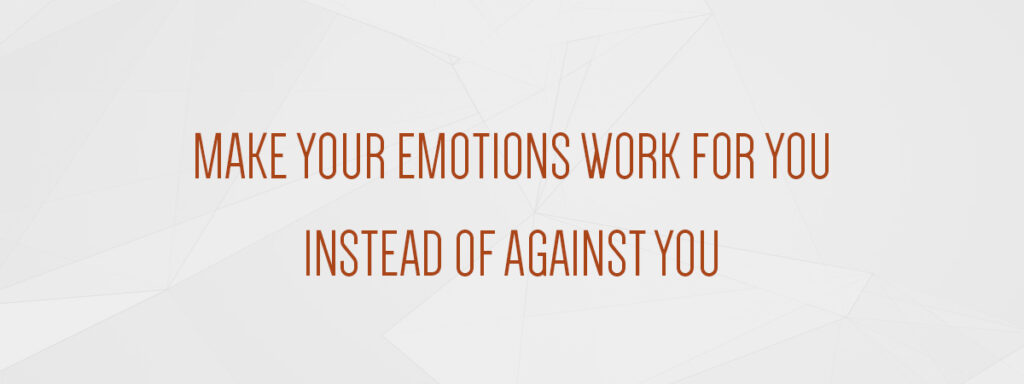

Emotional Intelligence – EI or EQ – is something everybody is talking about, but what exactly is it? One major aspect of EI is that you have the ability to perceive, evaluate and control emotions – in yourself as well as others – and use that information appropriately.
In other words, having emotional intelligence means that you can accurately identify your own emotions as well as those of others and have the ability to utilize these emotions and apply them to the task at hand – for example problem-solving or thinking.
On the other hand, you have the ability to manage emotions, which means you can control your own emotions and at the same time you have the ability to calm down or cheer up another person. Having emotional intelligence is hugely important when it comes to building strong, healthy relationships, whether that’s in your personal or professional life. It is also a key factor when it comes to your own happiness and success.
Here are our TOP 10 tips to develop emotional intelligence and improve your performance at work, your physical as well as mental health, your relationships and your social intelligence.

#1 Build Your Emotional Vocabulary
To develop emotional intelligence, you have to become emotionally literate. For one you have to be able to name emotions specifically and differentiate between similar emotions such as feeling lonely versus feeling sad. Besides that, it is essential to understand the profile of each emotion, define it and understand the message behind the emotion. Just like with learning any other language, we are able to pick up a good amount of words by simply paying attention, but it may be necessary to study up a little to become an expert. Make it your mission to become fluent in the language of emotions and learn the differences and nuances that they entail.
#2 Name Your Emotions
Sometimes emotions can overpower us like a wild current that sweeps us up and takes us for a ride. A simple practice to help calm the emotional wave is to name our emotions. Simply naming our emotions lessens the intensity of the emotions because we shine a cognitive spotlight on them. Give it a try and let us know if it works for you. Slightly different, but also quite powerful is to name the emotion in the third person. So instead of saying ‘I’m sad’, say ‘John is sad.’ It may feel odd, but it helps you to distance yourself from the emotions and allows you to be the observer from the outside.
#3 Observe Your Emotions
After you named your emotions, simply let them be for a while. Be angry, be sad, be happy, be excited, be frustrated, be exhilarated. We have been programmed to think that some emotions are bad and we have to push them away as soon as they pop up or explain them away. However, this gives them even more power. Simply sit with the emotion for a while and let them be. It takes approximately 6 seconds for the chemicals of an emotion to be absorbed into the body, so give yourself at least that long. Observe yourself and pay attention to what you feel and how those emotions enhance, distract, contribute or challenge you.
#4 Feel Your Emotions in Your Body
Every emotion can be felt in our physical body. For example when we are anxious, we may end up with sweaty palms or tight muscles. When we are excited to meet our partner for a date, we may feel our heart pumping in excitement and walk very lightly. Research has found that different emotions are universally associated with specific parts of your body, so pay attention to your body and with that you can familiarize yourself with your emotions.

#5 Overcome the Mindset of Good and Bad Emotions
We mentioned it earlier, we oftentimes think of some of our emotions as bad and as something that we should push away or suppress. However, emotions, no matter how challenging they may be in the moment, are simply data that exists to help us. Overcome the mindset of good and bad emotions and liberate yourself. Instead, make your emotions your ally that empower you to take control of your life. Acknowledge that your emotions are there to provide you with valuable information. They focus our attention and motivate us to take a specific course of action. So they aren’t good or bad, but rather have their own unique purpose and message.
#6 Recognize Patterns
Our brains have a natural tendency to follow neural pathways that exist already, which means that we like to form and follow patterns whether that’s with ourselves or in a relationship. So make it your mission to notice any emotional patterns you have and what triggers these patterns. When this happens, I feel that emotion and my typical reaction is XYZ. This gives you great insight and allows you to change the course of reaction over time. But the first step is to recognize the pattern in yourself.
#7 Write Down Your Emotions
In order to increase your emotional intelligence make it a habit to write down your emotions throughout the day. Check in with yourself on a regular basis and write down what’s going on inside yourself in this very moment. And you don’t have to choose just one emotion at a time. Emotions are complex and multi-layered and it’s completely normal to experience multiple emotions at one time, even if they seem to oppose each other. Writing them down is an important practice to improving your emotional intelligence, which at the same time ties in with some of the aspects we discussed earlier, like naming your emotions, observing your emotions and tuning in to your body.
#8 Take Responsibility for Your Emotions
This is probably one of the most challenging steps, but most likely also one of the most helpful ones when it comes to developing emotional intelligence. Keep in mind, your emotions are your own, they don’t come from anyone else and with that you have to take responsibility for them. If you feel hurt in response to something someone else said or did and you lash out at them, that’s your responsibility. They didn’t make you lash out but rather you didn’t control your emotions and therefore have to own your responsibility. Whatever happens, accept the responsibility for how you feel and how you react and with that you can improve all areas of your life.
#9 Practice Empathy with Yourself and Others
Empathy means that you understand how someone else feels and why and you are able to communicate that understanding to them. This applies to ourselves as well as other people and practicing empathy, meaning the understanding of emotions and behaviors, will hugely improve your emotional intelligence. Start practicing with yourself. When you notice a certain emotion ask yourself ‘Why am I feeling this way?’ At first you may not know what’s going on, but the more you pay attention to your emotions, the more you’ll notice different answers coming through.
#10 Ask Others for Perspective
More often than not we forget that other people view us very differently than we view ourselves and the other way around. Keep in mind, this is not about being right or wrong, this is simply about understanding that our perceptions can differ and that these different perceptions create different consequences. Take this as a learning experience and ask close friends about their perception of you in a certain situation. This will help you to understand how others see yourself, but it also helps you to understand others better as well.
Developing high emotional intelligence allows you to understand, manage and use your emotions in a positive way to communicate effectively, relieve stress, overcome challenges, empathize with others and defuse conflict. It is commonly defined by four major attributes: self-management, self-awareness, social awareness and relationship management.
MAKE YOUR EMOTIONS WORK FOR YOU INSTEAD OF AGAINST YOU
Joschi & Monika
#BoldNaked

Pingback: Nudie News